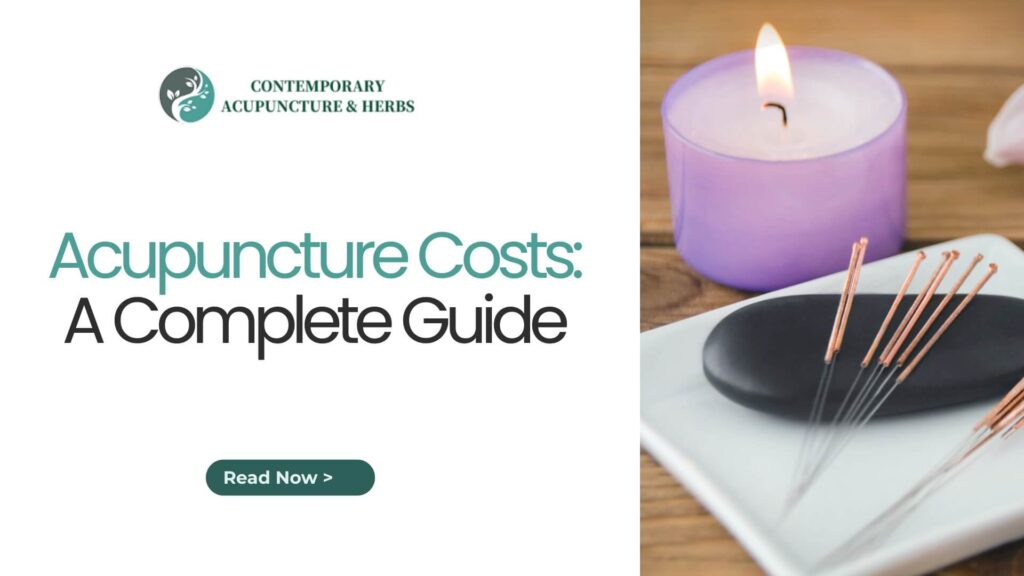Many people come to us seeking relief, balance, or simply a moment of calm in their busy lives. One of the first questions we hear is: how much does acupuncture cost? It’s an important question because your health matters, and so do your time and resources.
The cost of acupuncture can vary depending on where you live, the type of treatment you receive, and whether your insurance provides support.
In most places across the U.S., sessions range between $70 and $150. There are also options that make care more affordable, as well as specialized treatments that may cost more.
Our goal with this guide is to give you clarity. We’ll share what a typical session costs, what factors influence pricing, how insurance may help, and practical ways to plan for care.
With this information, you can step into your first session with confidence and peace of mind, knowing how to make acupuncture a lasting part of your overall well-being.
Find Gentle Relief That Lasts
Acupuncture is a path to better health, less pain, and deeper calm. We’re here to create a treatment plan that fits your needs and your lifestyle. With transparent pricing and a focus on your well-being, our goal is to help you feel your best.
How Much Does Acupuncture Cost on Average?
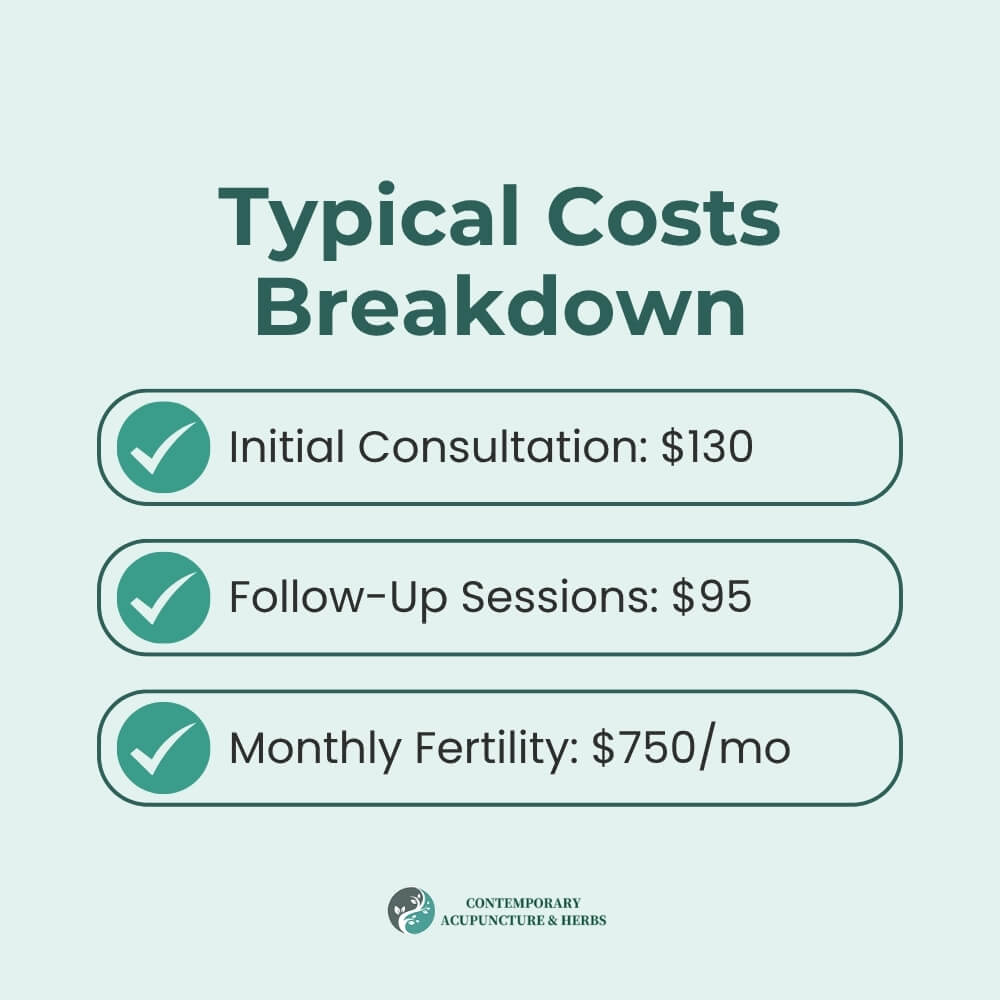
When people ask us about acupuncture, the cost of a session is usually the first detail they want to understand. While prices vary depending on several factors, there are some typical ranges you can expect.
Typical Session Costs
Across the U.S., acupuncture sessions generally range between $70 and $150, with the national average being around $110 per visit. This makes acupuncture a comparable investment to other professional health and wellness services.
Initial Consultation Costs
Your first visit is usually a little higher in price. This is because the initial consultation includes more than just treatment—it’s also the time when we review your health history, discuss your wellness goals, and create a personalized plan.
These first appointments typically range from $80 to $150, and some clinics may include a separate consultation or intake fee of $25 to $50.
Follow-Up Sessions
Once your treatment plan is in place, follow-up sessions are usually shorter and less expensive. These visits often cost between $60 and $100, depending on the clinic and the complexity of your care.
The difference in pricing between the first and follow-up sessions reflects the time, care, and planning that go into tailoring acupuncture specifically for you. By the time you return for follow-ups, we’re able to focus more directly on your treatment, which is why those visits tend to cost less.
Factors That Influence Acupuncture Pricing
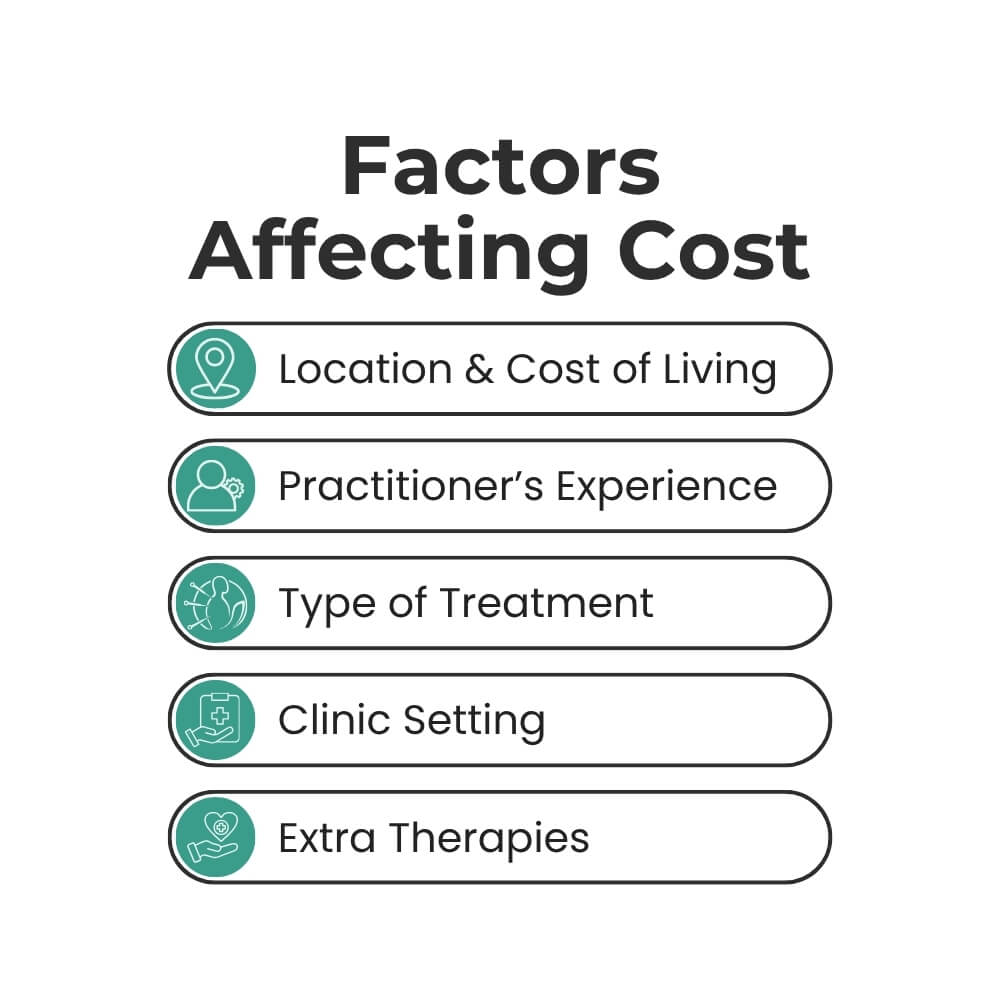
While average ranges give a helpful starting point, the exact cost of acupuncture can shift based on several important details. Understanding these factors can help you plan for care that feels both accessible and sustainable.
Location and Cost of Living
Where you live makes a difference. Clinics in larger cities such as New York, Los Angeles, or Chicago often charge more than those in smaller towns or suburban areas. This usually reflects the higher cost of living and operating a practice in those locations.
Practitioner’s Experience and Credentials
The background of the acupuncturist also plays a role. Practitioners with advanced training, decades of experience, or specialized certifications may charge more than those who are newer to the field.
Many patients find this additional expertise reassuring, especially when seeking care for complex or chronic conditions.
Type of Treatment
Not all acupuncture sessions are the same. Traditional acupuncture, electro-acupuncture, cosmetic acupuncture, and fertility-focused treatments can each carry different costs.
Add-on therapies like cupping, moxibustion, or herbal support may also influence the final price of a session.
Clinic Setting
The environment of your treatment matters. A private clinic with one-on-one sessions will generally cost more than a community setting, where several patients are treated in a shared space.
Both models can be effective. The difference is often in the level of privacy and personalization.
Treatment Complexity and Adjunct Therapies
Some care plans are straightforward, while others require more time, multiple points of treatment, or additional therapies.
When a session includes extra techniques such as heat therapy or herbal consultations, the price may reflect the added time and expertise.
Affordable Options for Acupuncture
Acupuncture should be accessible to anyone who wishes to benefit from it. While private sessions in individual treatment rooms are common, there are also lower-cost settings that make regular care easier to manage financially.
Community Acupuncture Clinics
In some cities, community clinics provide treatments in a shared room where several patients are seen at once. These sessions often cost between free and $75 per visit, making them one of the most affordable ways to receive acupuncture.
While the time with the practitioner may be shorter and less individualized, the treatments themselves can still be very effective.
Acupuncture Schools and Student Clinics
Another option for lower-cost care is through acupuncture schools. Students in training often provide treatments under the supervision of licensed practitioners.
These clinics usually offer reduced rates, allowing patients to experience quality care at a fraction of the price.
Who Benefits Most from These Options
Community and school-based clinics are often a good fit for people who want to try acupuncture for the first time, or for those who plan to receive treatment regularly but need to keep costs manageable.
While the environment may be less private, many patients value the affordability and the chance to maintain consistent care.
Who Benefits Most from These Options
We believe acupuncture should be within reach for anyone seeking balance and relief. That’s why we’re transparent about our pricing and offer options that support both your health and your budget. You can view our current rates and find the approach that feels right for you.
High-End Clinics and Package Deals
Just as there are affordable ways to experience acupuncture, there are also clinics that provide more specialized or private care. These options often come with a higher price point, but they may also include additional services and a more individualized experience.
Specialized or Boutique Acupuncture
Private clinics and boutique practices sometimes charge $90 to $180 or more per session.
This is especially true for treatments that include extras like cupping, electro-acupuncture, or cosmetic-focused care.
Many patients choose these settings because they value privacy, the calm environment, and the additional time spent with their practitioner.
Package Discounts
Many clinics offer package pricing to make ongoing care more affordable. A common example is a bundle of 10 sessions for $860 to $980, which lowers the per-session cost compared to paying individually.
For patients who plan to follow a longer treatment plan or maintain regular care, these packages can make a meaningful difference in overall cost.
Why Packages Offer Better Value
Because acupuncture often works best as a series of treatments, packages allow patients to commit to care while saving money in the long run.
They also help with consistency, which is an important part of reaching and maintaining wellness goals.
Does Insurance Cover Acupuncture?
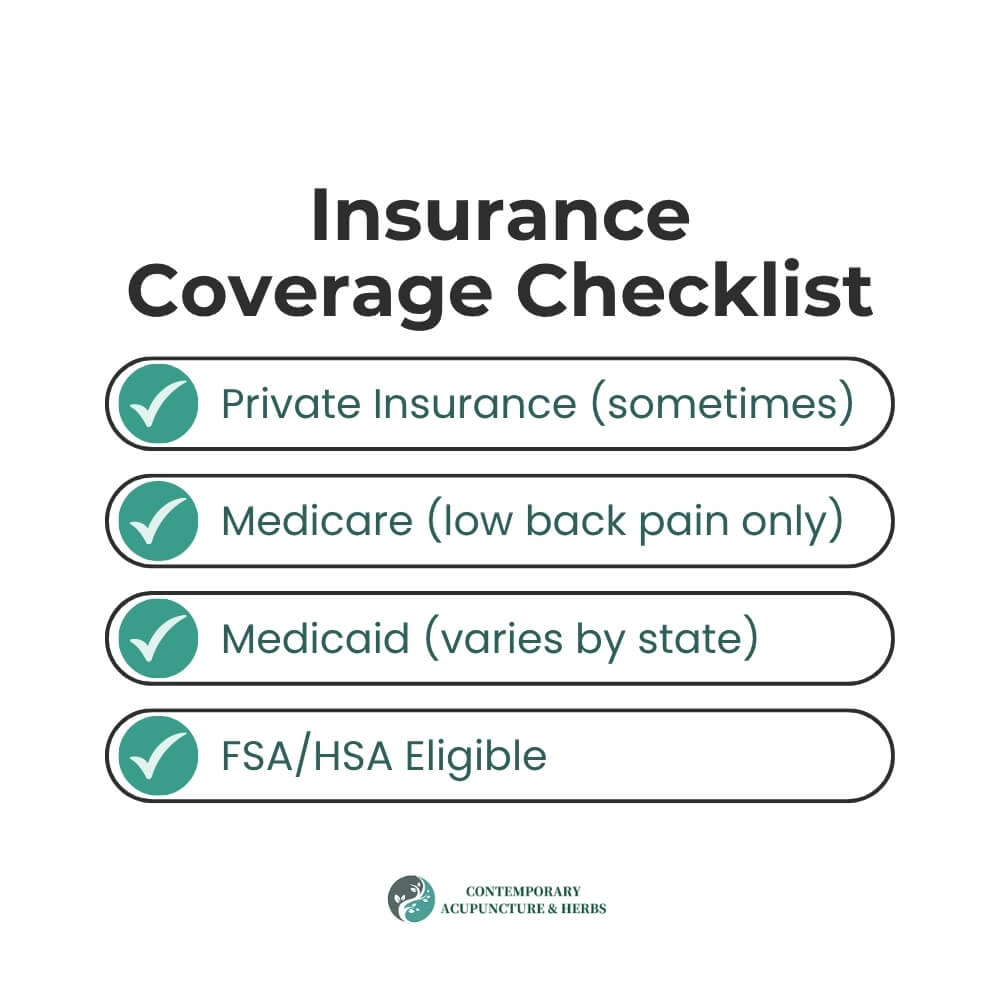
For many patients, the cost of care depends not only on the clinic they choose, but also on whether their insurance helps cover treatments.
Acupuncture coverage has improved over the years, but it can still vary quite a bit depending on the plan.
Private Insurance Plans
Some private insurance companies provide partial coverage for acupuncture, while others do not include it at all.
Coverage may also be limited to certain conditions, such as pain management. Because each plan is different, the best step is to call your insurance provider directly and ask about acupuncture benefits.
Medicare and Medicaid
Medicare currently covers acupuncture for chronic low back pain, with a limit of up to 20 sessions per year.
Patients are still responsible for the deductible and usually a 20% copay. Medicaid and veterans’ programs may cover acupuncture in some states, though availability depends on location and program rules.
Using FSA or HSA Accounts
If your insurance doesn’t include acupuncture, you may still be able to use a Flexible Spending Account (FSA) or Health Savings Account (HSA) to help pay for treatments. These accounts use pre-tax dollars, which can reduce out-of-pocket costs over time.
How to Verify Coverage
When checking your benefits, it can be helpful to:
- Ask whether acupuncture is covered and if there are limits on conditions or session numbers.
- Confirm whether your acupuncturist needs to be in-network.
- Clarify how claims are submitted—some clinics bill insurance directly, while others provide receipts for you to submit.
- Ask about your copay and deductible so you know what your share will be.
Understanding these details up front helps prevent surprises later and makes it easier to plan for your care.
How to Evaluate Acupuncturist Pricing and Value
When comparing acupuncture clinics, it’s natural to look at price first. But value goes beyond the number on the bill. Asking the right questions and knowing what to watch for can help you feel confident about your choice of care.
Questions to Ask Before Booking
- What does the initial fee include? Some clinics build consultation into the first visit, while others separate the intake fee.
- How are follow-up visits structured? Understanding whether they are shorter or differently priced can help you plan your budget.
- Are package or membership options available? This can lower the long-term cost if you know you’ll need multiple sessions.
- Do you provide receipts for insurance or FSA/HSA reimbursement? Clear billing practices can make it easier to use your benefits.
Red Flags to Watch Out For
While lower prices can be appealing, they should not come at the expense of quality. Be cautious of:
- Practitioners without proper licensing or credentials.
- Unusually low prices without clear explanation.
- Hidden fees or unclear policies.
Value Beyond the Price Tag
Many patients find comfort in knowing their acupuncturist has years of experience, advanced training, or a specialty focus. The clinic environment also matters.
Feeling relaxed, heard, and cared for is part of what makes acupuncture effective. When you consider these aspects alongside cost, you’ll have a clearer sense of the true value of your care.
What to Expect During a Typical Acupuncture Session
Understanding what happens during an acupuncture visit can ease any uncertainty and also help explain why costs differ between sessions.
First Visit (60–90 Minutes)
Your initial session usually takes longer than follow-ups. We’ll spend time reviewing your health history, discussing your current concerns, and creating a treatment plan tailored to your needs.
After this intake, you’ll receive your first treatment. Because this visit involves more time and care, the cost is typically higher than follow-ups.
Follow-Up Visits (30–60 Minutes)
Subsequent appointments are usually shorter. Since we already have your history and plan in place, these sessions focus more directly on treatment itself.
Many patients find the rhythm of regular visits both effective and calming, and these shorter sessions are usually less expensive than the initial intake.
What Drives Price Differences
Several details influence cost from session to session. Longer appointments, additional techniques such as cupping or electro-acupuncture, and individualized adjustments to your plan can all affect the final price.
Knowing this ahead of time helps you prepare and ensures there are no surprises along the way.
Long-Term Cost Considerations
Acupuncture is most effective when it’s part of a consistent plan. While some people feel noticeable changes after just one or two sessions, many conditions benefit from a series of treatments spread out over several weeks or months.
Understanding this can help you prepare for the investment and make acupuncture a sustainable part of your care.
Treatment Plans for Common Conditions
For issues such as pain, stress, or sleep support, treatment often begins with weekly sessions for 6 to 12 weeks. This allows the body to respond gradually and steadily to care.
Maintenance and Wellness Care
Once your main concerns improve, many patients choose to continue with monthly or seasonal visits to maintain balance and prevent symptoms from returning.
These maintenance sessions are usually less frequent and can be planned around your lifestyle and budget.
Budgeting Tips
- Packages and memberships: If you know you’ll need multiple sessions, these can reduce the overall cost.
- Community or school-based clinics: These may be a good option for ongoing wellness care at a lower rate.
- FSA/HSA accounts: If you have access to these, they can make regular treatments more affordable.
Thinking about acupuncture as part of a longer journey rather than a single session can help you plan ahead and make the most of its benefits.
Is Acupuncture Worth the Cost?
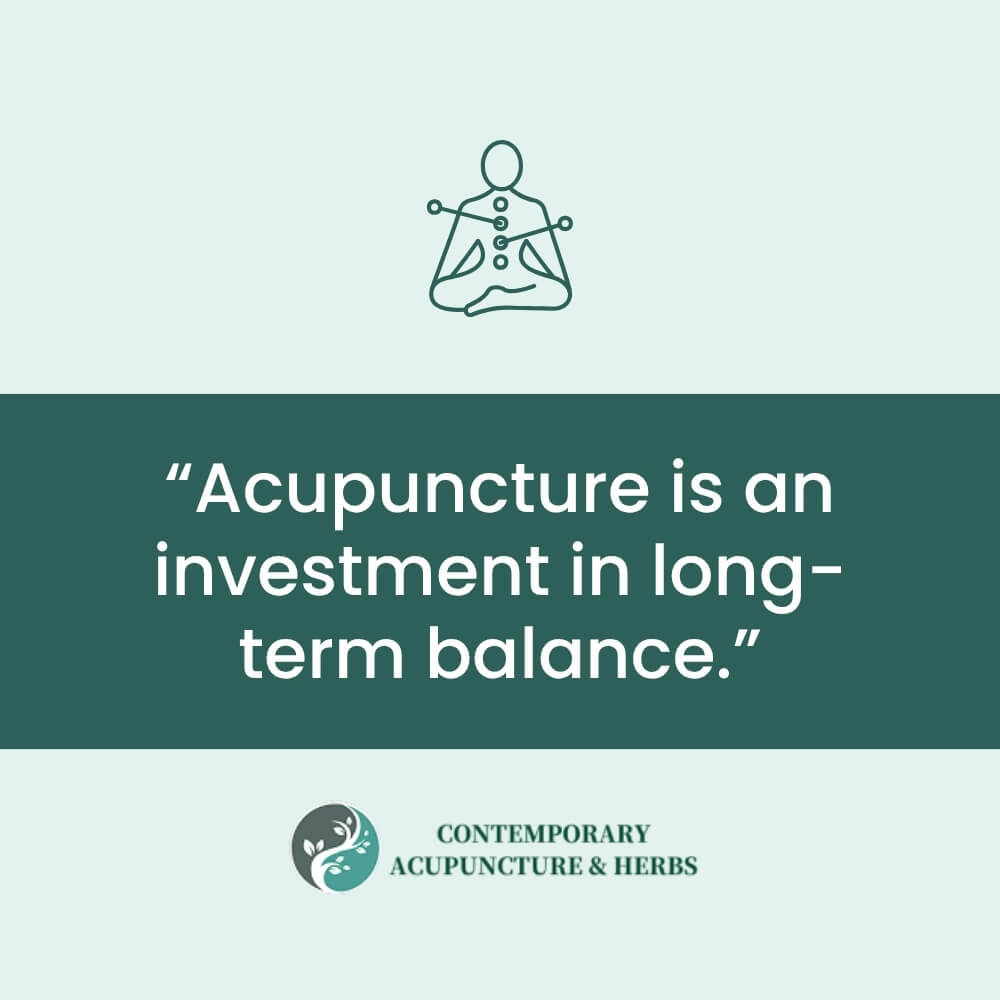
When considering acupuncture, many people weigh the financial commitment against the potential benefits. For us, the answer often comes down to the quality of life it helps create.
Benefits That Offset Cost
Patients frequently turn to acupuncture for relief from pain, stress, and sleep issues, but the benefits often extend beyond symptom management.
Many describe feeling more balanced, rested, and resilient in their daily lives. These improvements can be difficult to measure in dollars, yet they have a real impact on overall well-being.
Long-Term Value
In some cases, acupuncture may reduce the need for medications or other more costly interventions.
By supporting the body’s natural healing processes, acupuncture can become a proactive approach to health, rather than a reactive one. Over time, this may help lower other healthcare expenses.
Why Patients See It as an Investment
For many, the value of acupuncture is not only in the results but also in the experience—being cared for in a calm setting, feeling listened to, and having a treatment plan designed specifically for them.
When looked at this way, acupuncture becomes less about the cost of each session and more about investing in a healthier, more balanced future.
Take the Next Step Toward Better Health
Acupuncture is a natural, holistic way to support your health, and understanding the cost is an important part of planning your care.
While prices can vary based on location, practitioner experience, and treatment type, knowing the typical ranges—as well as options for insurance, packages, and community care—helps make the process more transparent.
Our hope is that this guide gives you the clarity and confidence you need to decide whether acupuncture is right for you. With thoughtful planning, it can be an affordable, long-term investment in your well-being.
At Contemporary Acupuncture, we’re here to make your care both accessible and meaningful, with clear pricing and treatments designed around your needs. When you’re ready to experience the benefits for yourself, booking your first session is the best next step.

